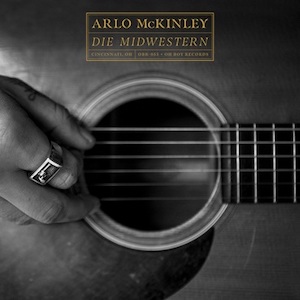
Arlo McKinley – Die Midwestern
Oh Boy Records – 14 August 2020
Had Jody Prine not played his late father John a couple of McKinley’s songs, there’s every chance 40-year-old Cincinnati singer songwriter Arlo McKinley would have given up on music entirely and still be delivering tuxedos. However, John was particularly taken with Bag Of Pills and, as a result, McKinley became the last artist Prine and his son signed to their label before the former’s death.
The solo debut (he previously released a 2014 live album as frontman with The Lonesome Sound) opens with the understated strum of We Were Alright, a number that starts out as an upbeat road song about driving with his girl and how “for the first time in a long time we were alright”, only to play the dream within a dream card as he wakes to realise they’ve broken up and tries to get back to the dream to be close to her again.
It sets a melancholic tone that permeates the album, the songs on which he says are mostly drawn from personal experience, and is followed by the honky-tonk waltz-time title track, Jessie Munson on fiddle, which addresses his ambivalent feelings about Ohio, tied there by memories (“this house is lonely now I’m here without you/so I sit and I wait for the sun”) but needing to leave to escape them and find a new life (“if we stick around we’ll surely expire/as our dreams slip right through our hands”).
Rick Steff’s piano and Ken Croomer’s steady drumbeat keep things in the barroom for the old school country sounds and high lonesome vocals of She’s Always Been Around (“she’s always around/hanging out in the same places/cause she knows that I’ll come crawling every time I’m breaking down”). Then comes the deal clinching Bag Of Pills, a moody, sparsely strummed gradually swelling autobiographically candid account of Ohio’s drug issues, part informed by his selling some pills to get money to take a girl out drinking and part by the addiction and the resulting deaths he witnessed growing around him, prompting the line “life, I don’t want it if it’s so easy to die”.
Dealing with anxiety and “the ghosts that still haunt me” fuels the slow bluesy Neil Young-styled slow sway tread of The Hurtin’ Is Done, Will Sexton on electric guitar, turning to drink to comfort the pain, if only for a while, as he sings “I learned to self-medicate and how to wait until the panic is gone/so I hide behind smiles/and whatever else gets me through/I’m not knowing what’s waiting for me”, fighting the demons one at time.
A more storytelling approach informs the phased reverb-guitar and organ coloured Tom Petty meets The Eagles Suicidal Saturday Night (“the things we did we knew weren’t right, just for fun,had us flying through Kentucky and fleeing fast from Tennessee/yeah we made a lot of money/made a lot more enemies …I don’t know I thought that it would be easy being criminals on the run”), fiddle joining once more on a song about both the need to escape (“before they even knew we were missing brother we were long gone”) and the need to return (“we should take some time and find our way back home”).
As mentioned, the album often deals hurt and loss, two further examples being Ghost Of My Best Friend and Gone For Good, the latter a muscular slow march beat regret-streaked reflection on the end of a long relationship through his lack of effort in trying to make it work (“your name is on my finger where a wedding band could be… I’m sorry that I stole from you so many of those years/I swear I’d give them back girl if I could”) that’s left him “hidin’ out in these bar rooms where no one knows my name/I find myself a corner and I drink away my shame”. The former, which closes the album, is a simple acoustic strummed reverie (“we were getting high on gasoline/sittin’ on the banks where the river bends/and we laughed and danced and sang/and we talked about everything”) of a friend who’s passed. But it comes with a note of hope and redemption as he sings “you couldn’t tell me much about the afterlife and such/just about the beauty of the end/you said no need to be afraid/and I’d understand it all someday” and that “you wanted me to know/you’d put a word in for me if you can”.
That glimmer of light shines elsewhere too. On the simple slow waltz Once Again love brings salvation (“my heart is rusted/I’ve been broken and I’ve been busted/but if you can tell me that I can trust it/then maybe this heart could love once again”) while the similarly styled Whatever You Want has him vowing “I could get sober and try to stay clean… I can leave in the morning or stay till the end …whatever you want me to be/then that’s what I’ll be”.
And, on the fiddle-driven, anthemic Walking Shoes, a song about moving forward and leaving behind the things keeping you trapped, of making good out of bad and giving and receiving forgiveness, he opens with “I don’t wanna get high anymore/I don’t wanna fight anymore/I don’t wanna settle old scores/I just wanna come home/back to the ones I love/where there’s still plenty of room to make it better without ever hurting anyone”. Whatever darkness McKinley has worked his way through, it has brought him out into the light of a new dawn and, fully justifying Prine’s faith, resulting in a terrific album of confession, expiation and catharsis that deserves to be up there with the year’s best.
Pre-Order Die Midwestern via Amazon
Photo Credit: David McClister

